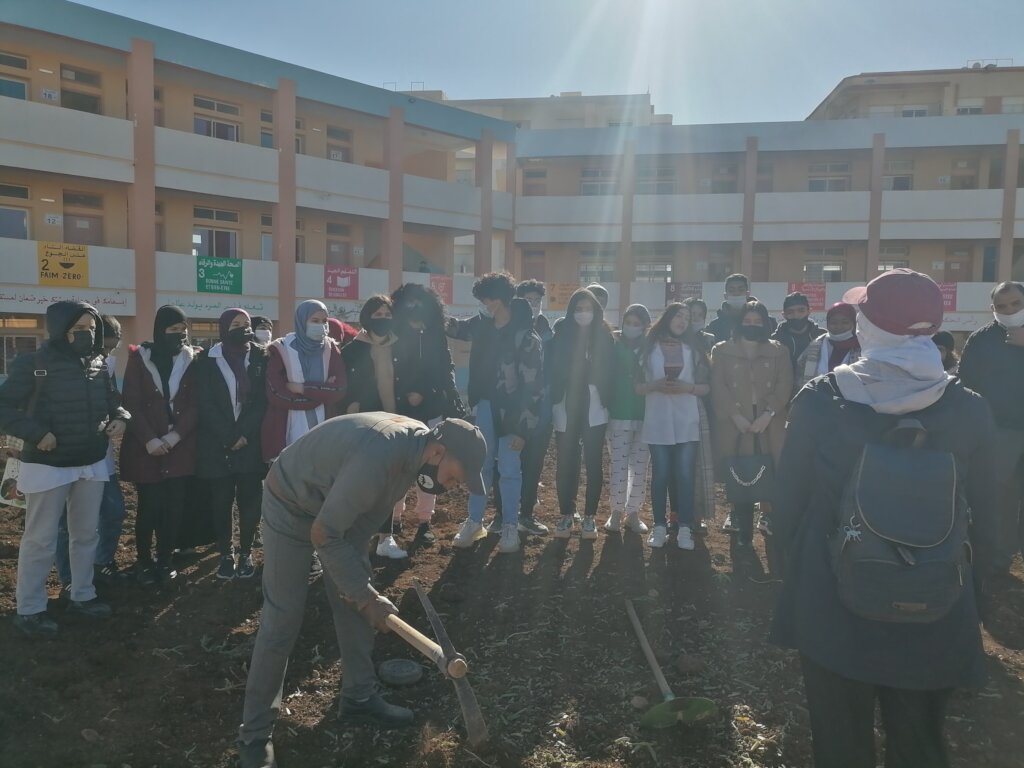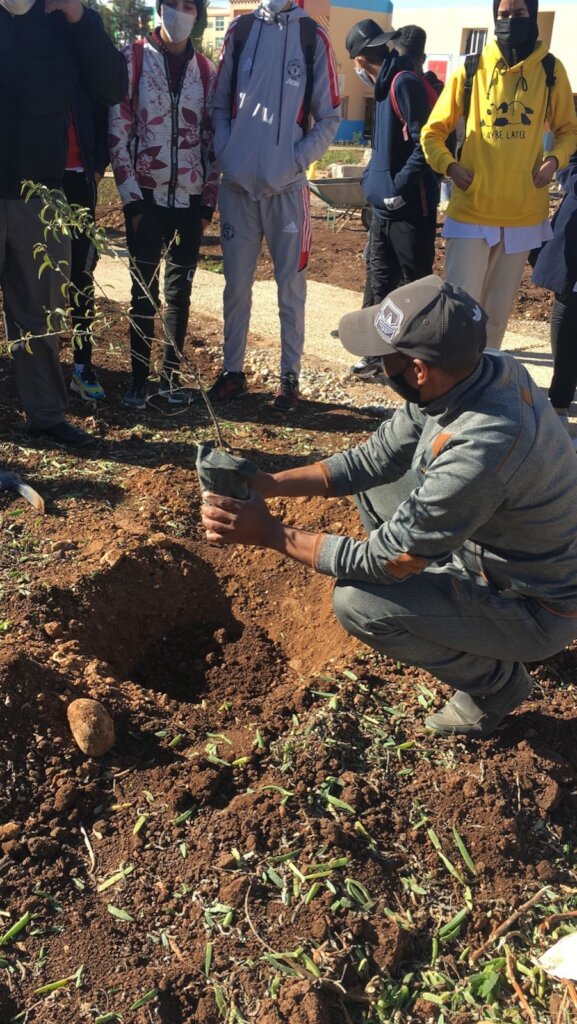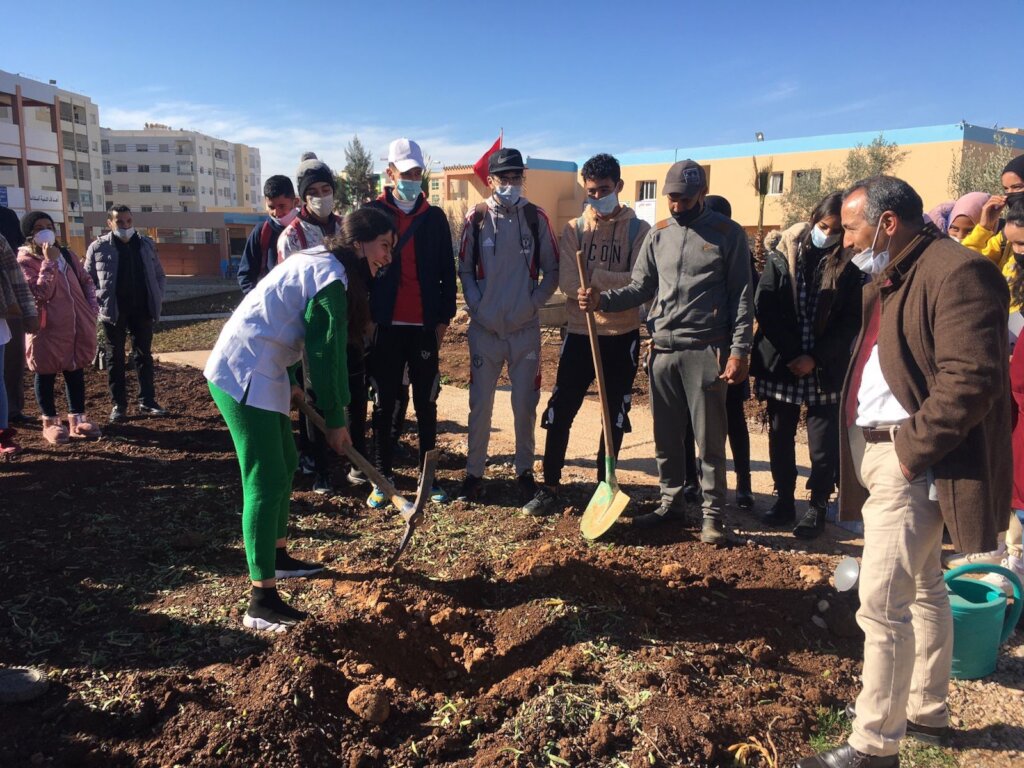By Amal Mansouri | HAF Field Coordinator
On the third Monday of January 2014, the High Atlas Foundation planted its millionth tree, and with that it reached one of its major goals related to sustainability. Ever since, planting trees on that date became the foundation's ritual. This year, the event took on a national dimension when the foundation decided to plant trees all over Morocco.
The symbolic importance of this occasion was reinforced when the event coincided with the Jewish holiday of Tu Bishvat, which encourages tree planting and the environment's preservation. In addition, January 17th, 2022, happened to be King, Jr. Day of Service. Having these three occasions on the same day, called green hope, was a precious moment for HAF and the community, not only to plant trees, but also to consider trees in particular, and the environment in general, from a cultural perspective. Therefore, the tree planting event was an opportunity for the communities to have an educational experience and to contribute to improving their local environment.
The tree planting in the Fez-Meknes region took place in different locations such as Fez and El Menzel. I was one of the participants who attended the event in Fez, where we planted almond trees at Bouaabid-Saiss high school. The school has already prepared a place in the yard in order to plant trees, which they have already started doing. Therefore, the HAF initiative came at the right time and place to support and complement their plans. Prior to the planting activity, the principal gathered the students, presented the context, and let the HAF staff take the lead to present the foundation and explain the objectives of the activity.
The students were very excited and participated, along with the principal and HAF staff, in the tree planting. They listened attentively when we were explaining the procedure of planting the tree and helped implement it. This was not the first time the students had heard about sustainable development, the importance of protecting the environment, and the benefits of trees, because they had school subjects related to these aspects. In that context, it was amazing to see that the school has all 17 of the sustainable development goals painted on the walls, which is a great way to raise awareness about that topic and help the youngsters learn more about it in an implicit and creative way.
To conduct the cultural activity, I went back to the nursery in the faculty of Chariaa, where we initially took the plants, along with four participants from the legal clinic. The activity was designed in a way that allows us to think deeply about how certain stories make us associate particular values and concepts with different kinds of trees and how each of us defines the trees according to our experience and cultural background. The goal is to uncover the hidden connection between nature, culture, and identity.
When asked about the importance of tree planting, all the participants agreed that humans need trees to survive and that trees play a vital role in our lives in providing us with oxygen and removing pollutants from the air. Not only do they help us stay physically healthy, but trees also help reduce stress and improve our mental health. "When I'm in a place where I'm surrounded by trees, I feel very comfortable and at peace," said one of the participants. Living in a place where trees are planted encourages nature-based and outdoor activities.
The activity served as a reminder that we need more events to commemorate the planting of trees in our communities. Through our conversation, we got the chance to contemplate our ancestors' lifestyles, which evolved around tree planting since the majority worked in agriculture.Trees impacted their lives economically, socially, and environmentally. But with industrialisation, people started gradually forgetting about the importance of preserving green and agricultural spaces. Therefore, nowadays we are witnessing an increase in natural disasters and environmental crises such as climate change.
Moreover, through the activity, we were able to revisit some of our childhood memories that are related to trees. In that regard, when asked about how trees affected their identities, a participant replied: "In my hometown there was a big grape tree called laanqud, which means a sprig in Moroccan Darija and classical Arabic. Families used to gather there for picnics, and I used to play with my friends there all the time and eat grapes. It was a landmark. Also, it used to produce important quantities of grapes that all the community shared. Sadly, because of the drought, the tree died and became harmful, so the community had to cut it.”
We also discussed how particular trees symbolize the same concepts for different people regardless of their nation, culture, or religion , such as how olive trees symbolize peace and cedar trees symbolize greatness. The fact that a tree has this power to bring people together to agree on one thing is what the USAID Dakira program aims to discover and explore.
During our conversation on how to preserve the environment and instill it as an act in our culture, it was great and heartwarming to hear one of the participants say: "I personally don't need someone to remind me that I need to protect trees, it just comes naturally. I will never hesitate to participate in events like this because, in the end, it makes me feel satisfied and valued. With this simple act, I know that I contributed to making a change and improving the environment. "
This article was completed with the support of the United States Agency for International Development (USAID), and the High Atlas Foundation is solely responsible for its content, which does not necessarily reflect the views of the USAID or the Government of the United States.
Project reports on GlobalGiving are posted directly to globalgiving.org by Project Leaders as they are completed, generally every 3-4 months. To protect the integrity of these documents, GlobalGiving does not alter them; therefore you may find some language or formatting issues.
If you donate to this project or have donated to this project, you can receive an email when this project posts a report. You can also subscribe for reports without donating.
Support this important cause by creating a personalized fundraising page.
Start a Fundraiser

